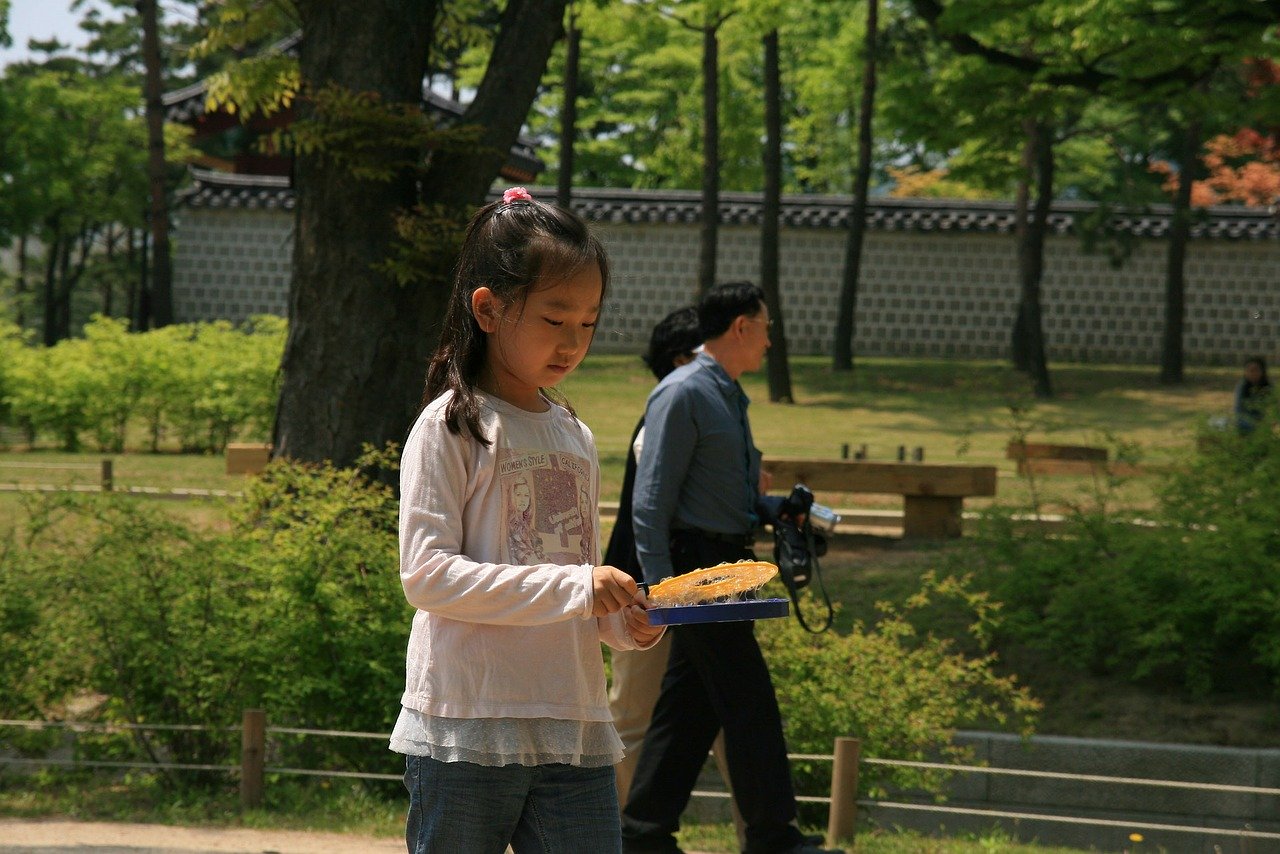Image by PublicDomainPictures from Pixabay.
In this blog post we’ll look at vocabulary and expressions that you can use to describe people in Korean.
이 사람은 내 친구예요. i saram-eun nae chingu yeyo. This is my friend.
Let’s start with phrases you can use to introduce people and say how you know each other.
- 이 사람은 내 친구에요.
i saram-eun nae chingu yeyo.
This is my friend. - 우리는 함께 일해요.
uri-neun hamkke ilhaeyo.
We work together. - 우리는 함께 일하곤 했어요.
uri-neun hamkke ilhagon haesseoyo.
We used to work together. - 우리는 함께 학교에 다녀요.
uri-neun hamkke haggyo-e danyeoyo.
We go to school together. - 우리는 함께 학교에 다녔어요 .
uri-neun hamkke haggyo-e danyeosseoyo.
We went to school together.
- 어디에서 만났어요?
eodi-eseo mannasseoyo?
Where did you meet each other? - 우리는 대학에서/ 파티에서/ 술집에서/ 커피숍에서 만났어요.
uri-neun daehag-eseo/ pati-eseo/ suljib-eseo/ keopisyob-eseo mannasseoyo.
We met at university/ at a party/ at a bar/ at a coffee shop. - 우리는 서로 아는 친구들이 있어요.
uri-neun seolo aneun chingudeul-i isseoyo.
We have mutual friends. - 우리는 오래전부터 알고 지낸 왔어요.
uri-neun olaejeonbuteo algo jinaen wasseoyo.
We’ve known each other for years. - 우리는 함께 자랐어요.
uri-neun hamkke jalasseoyo.
We grew up together. - 우리는 이웃 이에요.
uri-neun ius ieyo.
We’re neighbors.
그는 키가 커요. geu-neun ki-ga keoyo. He’s tall.
If you’re telling someone about a friend, you may want to describe him or her. Let’s start with physical characteristics. Keep in mind that you don’t normally use pronouns like 그 geu (he) or 그녀 geunyeo (she) when it’s clear from content who you’re talking about.
- (그는/ 그녀는) 어떻게 생겼어요?
(geu-neun/ geunyeo-neun) eotteohge saenggyeosseoyo?
What does he/she look like? - (그는/그녀는) 키가 커요.
(geu-neun/ geunyeo-neun) ki-ga keoyo.
He’s/She’s tall. - 그는/그녀는 키가 작아요.
geu-neun/ geunyeo-neun ki-ga jagayo.
He’s/She’s short. - 그는 잘 생겼어요.
geu-neun jal saeng-gyeoss-eoyo.
He’s handsome. - 그녀는 아름다워요.
geunyeo-neun areumdawoyo.
She’s beautiful. - 그는/그녀는 말랐어요.
geu-neun/ geunyeo-neun mallasseoyo.
He’s/She’s thin. - 그는/그녀는 뚱뚱해요.
geu-neun/ geunyeo-neun ttungttunghaeyo.
He’s/She’s fat. - 그는/그녀는 젊어요.
geu-neun/ geunyeo-neun jeolmeoyo.
He’s/She’s young. - 그는/그녀는 늙었어요.
geu-neun/ geunyeo-neun neulgeosseoyo.
He’s/She’s old. - 그는/그녀는 몸매가 좋아요.
geu-neun/ geunyeo-neun mommae-ga johayo.
He’s/She’s in shape. - 그는/그녀는 몸매가 좋지 않아요.
geu-neun/ geunyeo-neun mommae-ga johji anhayo.
He’s/She’s out of shape.
그녀는 머리가 길어요. geunyeo-neun meoli-ga gileoyo. She has long hair.
People have all sorts of different 머리모양/ 헤어스타일 meolimoyang/ heeoseutail hairstyles, so that’s a common way to describe people.
- 그는/그녀는 머리가 짧아요.
geu-neun/ geunyeo-neun meoli-ga jjalbayo.
He/She has short hair. - 그는/그녀는 머리가 길어요.
geu-neun/ geunyeo-neun meoli-ga gileoyo.
He/She has long hair. - 그는/그녀는 생머리예요.
geu-neun/ geunyeo-neun saengmeoliyeyo.
He/She has straight hair. - 그는/그녀는 곱슬머리예요.
geu-neun/ geunyeo-neun gobseulmeoliyeyo.
He/She has curly hair. - 그는/그녀는 금발 머리/검은 머리예요.
geu-neun/ geunyeo-neun geumbal meoli/geom-eun meoliyeyo.
He/She has blond hair/black hair. - 그는/그녀는 빨간머리/갈색머리/회색머리예요.
geu-neun/ geunyeo-neun ppalganmeoli/galsaegmeoli/hoesaegmeoliyeyo.
He/She has red hair/brown hair/gray hair. - 그녀는 땋은 머리를 하고 있다.
geunyeo-neun ttah-eun meoli-leul hago issda.
She has braids. - 그는 대머리에요.
geu-neun daemeolieyo.
He’s bald. - 그는 콧수염/턱수염이 있어요.
geu-neun kossuyeom/ teogsuyeom-i isseoyo.
He has a mustache/beard.
성격 seong-gyeog Personalities
Sometimes we describe people we know by talking about their personality types.
- 그는/그녀는 어떤 성격을 가지고 있어요?
geu-neun/ geunyeo-neun eotteon seong-gyeog-eul gajigo isseoyo?
What kind of personality does he/she have? - 그는/그녀는 수줍음을 타요.
geu-neun/ geunyeo-neun sujubeum-eul tayo.
He’s/She’s shy. - 그는/그녀는 외향적이에요.
geu-neun/ geunyeo-neun oehyangjeog-ieyo.
He’s/She’s outgoing. - 그는/그녀는 진지해요.
geu-neun/geunyeoneun jinjihaeyo.
He’s/She’s serious. - 그는/그녀는 불안해요.
geu-neun/ geunyeo-neun bul-anhaeyo.
He’s/She’s anxious. - 그는/그녀는 느긋해요/편안해요.
geu-neun/ geunyeo-neun neugeushaeyo/ pyeon-anhaeyo.
He’s/She’s relaxed/easy-going. - 그는/그녀는 행복한 사람이에요.
geun-eun/ geunyeo-neun haengboghan saram-ieyo.
He’s/She’s a happy person. - 그는/그녀는 불행한 사람이에요.
geu-neun/ geunyeo-neun bulhaenghan saram-ieyo.
He’s/She’s an unhappy person. - 그는/그녀는 매우 체계적이에요.
geu-neun/ geunyeo-neun maeu chegyejeog-ieyo.
He’s/She’s very organized. - 그는/그녀는 낙관론자예요.
geu-neun/ geunyeo-neun naggwanlonjayeyo.
He’s/She’s an optimist. - 그는/그녀는 비관론자예요.
geu-neun/ geunyeo-neun bigwanlonjayeyo.
He’s/She’s a pessimist.
그녀가 좋아요. geunyeo-ga johayo. I like her!
If you like someone, 긍정적인 성격 특성 geungjeongjeog-in seong-gyeog teugseong positive personality traits are probably something you would use to describe them.
- 그는/그녀는 성격이 아주 좋아요.
geu-neun/ geunyeo-neun seong-gyeog-i aju johayo.
He/She has a great personality. - 나는 그녀를 많이 좋아해요.
na-neun geunyeo-leul manh-i johahaeyo.
I like her a lot. - 나는 그를 많이 좋아해요.
na-neun geu-leul manh-i johahaeyo.
I like him a lot. - 그는/그녀는 좋은 친구예요.
geu-neun/ geunyeo-neun joheun chingu-yeyo.
He/She is a good friend. - 그는/그녀는 매우 흥미로워요.
geu-neun/ geunyeo-neun maeu heungmilowoyo.
He’s/She’s very interesting. - 그는/그녀는 매우 쾌활해요.
geu-neun/ geunyeo-neun maeu kwaehwalhaeyo.
He’s/She’s very cheerful. - 그는/그녀는 항상 기분이 좋아요.
geu-neun/ geunyeo-neun hangsang gibun-i johayo.
He’s/She’s always in a good mood. - 그는/그녀는 매우 친절해요/ 착해요.
geu-neun/ geunyeo-neun maeu chinjeolhaeyo/ chaghaeyo.
He’s/She’s very friendly/nice. - 그는/그녀는 의리 있는 친구예요.
geu-neun/ geunyeo-neun uili itneun chingu-yeyo.
He’s/She’s a loyal friend. - 그녀는 사려 깊어요.
geunyeo-neun salyeo gip-eoyo.
She’s thoughtful of others. - 그는/그녀는 열린 사람이에요.
geu-neun/ geunyeo-neun yeollin saram-ieyo.
He’s/She’s open-minded. - 그는/그녀는 겸손해요.
geu-neun/ geunyeo-neun gyeomsonhaeyo.
He’s/She’s modest. - 그는/그녀는 모든 사람과 잘 지내요.
geu-neun/ geunyeo-neun modeun salamgwa jal jinaeyo.
He/She gets along with everyone.
그를 좋아하지 않아요. geu-leul joh-ahaji anhayo. I don’t like him!
On the other hand, if you don’t like someone, 부정적인 성격 특성 bujeongjeog-in seong-gyeog teugseong negative personality traits are what you’d use to describe them.
- 나는 그를/그녀를 좋아하지 않아요.
na-neun geu-leul/ geunyeo-leul johahaji anhayo.
I don’t like him. I don’t like her. - 그는/그녀는 나를 짜증나게 해요.
geu-neun/ geunyeo-neun na-leul jjajeungnage haeyo.
He/She annoys me/gets on my nerves. - 그는/그녀는 항상 기분이 안 좋아요.
geu-neun/ geunyeo-neun hangsang gibun-i an johayo.
He’s/She’s always in a bad mood. - 그는/그녀는 심술궂어요.
geu-neun/ geunyeo-neun simsulguj-eoyo.
He’s/She’s mean/unfriendly. - 그는/그녀는 고집이 세요.
geu-neun/ geunyeo-neun gojib-i seyo.
He’s/She’s stubborn. - 그는/그녀는 마음이 좁아요.
geu-neun/ geunyeo-neun ma-eum-i jobayo.
He’s/She’s closed-minded. - 그는/그녀는 둔해요/ 지루해요.
geu-neun/ geunyeo-neun dunhaeyo/ jiluhaeyo.
He’s/She’s dull/boring. - 그는/그녀는 이기적이에요.
geu-neun/ geunyeo-neun igijeog-ieyo.
He’s/She’s selfish. - 그는/그녀는 거만해요.
geu-neun/ geunyeo-neun geomanhaeyo.
He’s/She’s arrogant. - 그는/그녀는 믿을 수 없어요.
geu-neun/ geunyeo-neun mid-eul su eobseoyo.
He’s/She’s not trustworthy. - 그는 배려심이 없어요.
geu-neun baelyeosim-i eobseoyo.
He’s inconsiderate. - 그는/그녀는 멍청이에요.
geu-neun/ geunyeo-neun meongcheong-ieyo.
He’s/She’s a jerk!
그는 항상 웃어요. geu-neun hangsang useoyo. He always smiles.
We often describe people by talking about their 취미 chwimi habits.
- 그녀는 항상 웃어요.
geunyeo-neun hangsang useoyo.
She smiles all the time. She never smiles. - 그녀는 절대 웃지 않아요.
geunyeo-neun jeoldae usji anhayo.
She never smiles. - 그는 항상 웃어요. 그는 절대 웃지 않아요.
geu-neun hangsang useoyo. geu-neun jeoldae usji anhayo.
He laughs all the time. He never laughs. - 그녀는 매우 열심히 일해요.
geunyeo-neun maeu yeolsimhi ilhaeyo.
She works very hard. - 그는 게을러요.
geuneun geeulleoyo.
He’s lazy. - 그녀는 불평을 많이 해요.
geunyeo-neun bulpyeong-eul manhi haeyo.
She complains a lot. - 그녀는 절대 불평하지 않아요.
geunyeo-neun jeoldae bulpyeonghaji anhayo.
She never complains. - 그는 어떤 재미있는 일도 결코 하고싶어 하지 않아요.
geu-neun eotteon jaemiitneun ildo gyeolko hagoship-eo haji anhayo.
He never wants to do anything fun. - 그녀는 항상 신나는 일을 하고싶어 해요.
geunyeo-neun hangsang shinnaneun il-eul hagoship-eo haeyo.
She always wants to do something exciting. - 그녀는 운동을 많이 해요.
geunyeo-neun undong-eul manh-i haeyo.
She works out a lot. - 그는 비디오 게임을 너무 많이 해요.
geu-neun bidio geim-eul neomu manh-i haeyo.
He plays too many video games. - 그는 항상 규칙을 따라요.
geu-neun hangsang gyuchig-eul ttalayo.
He always follows the rules. - 그녀가 원하는 것은 무엇이든 해요.
geunyeo-ga wonhaneun geos-eun mueosh-ideun haeyo.
She does whatever she wants. - 그녀는 친구들과 자주 밖에 나가요.
geunyeo-neun chingudeulgwa jaju bakk-e nagayo.
She goes out with her friends a lot. - 그는 집에 있는 것을 좋아해요.
geu-neun jib-e issneun geos-eul joh-ahaeyo.
He likes to stay home. - 그녀는 스포츠를 많이 해요.
geunyeo-neun seupocheu-leul manh-i haeyo.
She plays a lot of sports. - 그는 항상 책을 읽어요.
geu-neun hangsang chaeg-eul ilgeoyo.
He reads all the time. - 그는 멋진 파티를 열어요.
geu-neun meotjin pati-leul yeol-eoyo.
He throws great parties. - 그녀는 친구들을 위해 많은 일을 한다.
geunyeo-neun chingudeul-eul wihae manh-eun il-eul haeyo.
She does a lot for her friends.
그녀는 정말 영리해요. geunyeo-neun jeongmal yeonglihaeyo. She’s really smart.
People have different 재능 jaeneung talents and 호기심 hogishim interests, and sometimes we describe people by saying what they’re good (or not so good!) at.
- 그는/그녀는 영리해요/똑똑해요.
geu-neun/ geunyeo-neun yeonglihaeyo/ ttogttoghaeyo.
He’s/She’s smart/intelligent. - 그는/그녀는 역사에 /언어에 /예술에 /영화에 관심이 있어요.
geu-neun/ geunyeo-neun yeogsa-e/ eon-eo-e / yesul-e/ yeonghwa-e gwansim-i isseoyo.
He’s/She’s interested in history/languages/art/movies. - 그는/그녀는 글을 잘 써요/요리를 잘 해요/그림을 잘 그려요/노래를 잘 해요.
geu-neun/ geunyeo-neun geul-eul jal sseoyo/ yolileul jal haeyo/ geulim-eul jal geulyeoyo/ nolaeleul jal haeyo.
He/She writes/cooks/paints/sings very well. - 그는/그녀는 취미가 많아요.
geu-neun/ geunyeo-neun chwimi-ga manh-ayo.
He/She has a lot of hobbies. - 그는/그녀는 동물을 좋아해요.
geu-neun/ geunyeo-neun dongmul-eul johahaeyo.
He/She loves animals. - 그는/그녀는 여행을 좋아해요.
geu-neun/ geunyeo-neun yeohaeng-eul johahaeyo.
He/She loves to travel. - 그는/그녀는 친구들과 시간 보내는 것을 좋아해요.
geu-neun/ geunyeo-neun chingudeulgwa shigan bonaeneun geoseul johahaeyo.
He/She loves to spend time with friends. - 그는/그녀는 테니스를 잘해요.
geu-neun/ geunyeo-neun teniseu-leul jalhaeyo.
He’s/She’s good at tennis. - 그는/그녀는 테니스를 못해요.
geu-neun/ geunyeo-neun teniseu-leul mot haeyo.
He’s/She’s bad at tennis. - 그는/그녀는 재능 있는 음악가예요.
geu-neun/ geunyeo-neun jaeneung itneun eumag-ga yeyo.
He’s/She’s gifted musician. - 그는/그녀는 노래를 잘 못해요.
geu-neun/ geunyeo-neun nolae-leul jal mot haeyo.
He/She can’t sing well. - 그는/그녀는 춤을 잘 못춰요.
geu-neun/ geunyeo-neun chum-eul jal mot chwoyo.
He/She can’t dance well. - 그는/그녀는 매우 창의적이에요.
geu-neun/ geunyeo-neun maeu changuijeog-ieyo.
He’s/She’s very creative. - 그는/그녀는 창의적이지 않아요.
geu-neun/ geunyeo-neun chang-uijeog-iji anhayo.
He’s/She’s not very creative. - 그를/그녀를 정말 좋아할꺼에요.
geu-leul/ geunyeo-leul jeongmal johahalkkeoeyo.
You would really like him/her!
Learn Korean with the Language Garage
Check out our other posts on Korean language, culture, and more. And if you’re looking for convenient and affordable live Korean lessons with a real teacher, check out The Language Garage. Our lessons are given online in a virtual classroom, so it doesn’t matter where you live or work – we can come to you. And we have flexible options, with a free trial so that you can decide if there’s a fit. Check us out!





